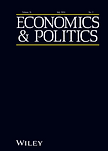Peer-Reviewed Publications

(2024) Taking Sides: Corporate Social Responsibility and Political Ideology. Economics & Politics, 1-24. (with Andrey Tomashevskiy) Abstract: In the United States and other countries, large private firms are increasingly more likely to take public political stances on controversial issues. Firms behave as ideological actors when they take sides in large public debates on social and economic issues. These stances may involve public speech, changes in the terms of service, or in internal reorganization and intrafirm actions. Despite the increase in firms' political actions, firms' ideological orientations remain unexamined. To answer this question, we collect corporate social responsibility statements from Fortune 1000 firms. Using semisupervised topic models, we identify topics that reflect stances on environmental and social issues. We then examine if firms are more likely to take stances on political issues due to pragmatic or ideological factors. We find that while pragmatic considerations play a role, firms' political stances are more driven by the ideological orientation of employees and managers. This research contributes a novel measure of firm ideology and sheds new light on the determinants of corporate political activity. Access: https://doi.org/10.1111/ecpo.12288

(2022) Turkey’s Isolation from the Eastern Mediterranean Gas Forum: Ideational Mechanisms and Material Interests. Turkish Studies, 23(1), 1-30. (with Pınar Ipek) Abstract: The energy politics highlight rising tensions and new cooperative patterns in the Eastern Mediterranean region. We question the reasons for the lack of cooperation between Turkey and regional states during the regionalization process, in terms of offshore hydrocarbon resources development, between 2010 and 2020. In contrast to power-driven accounts for cooperation, we demonstrate the role of ideational mechanisms through framing analysis and process tracing. We argue that Turkey’s isolation from the Eastern Mediterranean Gas Forum and shifts in Turkish foreign policy preferences are explained plausibly by cognitive priors, redefined causal ideas, and emulation of exogenous ideas. Access: https://doi.org/10.1080/14683849.2021.1925884
Work-in-Progress
Political Economy of Firms
Carbon Choices: MNCs and Climate Regulation Policies to mitigate and adapt to climate change entail significant economic costs for firms. However, despite these costs, many multinational corporations (MNCs) have integrated Environmental, Social, and Governance (ESG) strategies into their business plans. Exploring the drivers and consequences of firm-level ESG strategies is essential for tackling climate change since a considerable portion of global carbon emissions is produced by a relatively small number of MNCs. This paper employs a multi-method approach to investigate why firms increasingly commit to seemingly costly environmental self-regulation and whether these self-regulatory activities preempt public demand for stringent climate regulation. First, the paper introduces a novel text-based measure of firm-level environmental self-regulation using an original dataset of ESG reports from Fortune 1000 companies. The analysis reveals that carbon-intensive industries are more likely to emphasize climate-change-related topics in their ESG reports. Second, through an online survey experiment with a representative sample of 2,466 respondents in the US, I demonstrate that people are more likely to demand stringent public regulation for firms with low environmental performance, particularly those headquartered abroad. Nonetheless, corporate self-regulation does not preempt demands for formal environmental regulation. These findings contribute to the literature on the international political economy of climate change, public attitudes toward investment restrictions, and, more broadly, the role of businesses in contentious politics.
Corporate Political Activity and Foreign Firms: The Role of Issue Salience (with Andrey Tomashevskiy) Foreign firms are increasingly more likely to participate in the US political system, whether through lobbying, campaign contributions, or public stances on political issues. However, it is unclear how individuals evaluate corporate political activity by foreign firms. In this paper, we examine individual attitudes towards the political activity of multinational firms. We argue that individuals may be more tolerant of foreign corporate political activity when it involves favorable stances on issues that are high-salience for an individual. We evaluate this hypothesis using a survey experiment with a representative sample of US voters. Our experiment provides evidence that liberal voters are more likely to support corporate activity by foreign firms that act to promote liberal policies. We then use novel AI tools to examine how issue salience affects voters’ responses. Individuals that received a personalized treatment highlighting high-salience issues were more likely to support corporate political activity. This suggests that voters are willing to tolerate some degree of political activity that aligns with the voters' preferences. Our research sheds new light on the political causes and effects of corporate political activity. This research also suggests novel implications for the use of AI in research.
Resources and Territorial Disputes
Domestic Politics of Resource-Rich Territory: Loss Aversion and Energy Security In the post-1945 period, the declining profitability of conquest and the establishment of territorial integrity norms have constrained leaders' efforts to claim new territories. However, maritime territories, characterized by relaxed norms of sovereignty and the presence of valuable resources such as oil and natural gas, offer unique opportunities for such claims. Maritime territorial disputes often involve claims of defending sovereignty and preventing territorial losses against perceived illegal claims by adversaries. Leaders can strategically manipulate framing around resource-rich territories, invoking concepts like national independence and energy security to rally public support for aggressive territorial policies. In turn, they signal a stronger resolve to achieve better bargaining outcomes. However, these framing strategies can backfire by entrenching public willingness to use force and forcing opposition groups into rigid stances, thereby obstructing subsequent attempts to reach mutually agreeable bargaining outcomes. This paradox can lead to protracted territorial disputes despite joint economic incentives for peaceful resolution. Using two original online survey experiments conducted in the US and Turkey, I show that a combination of territorial loss and energy independence framing increases support for aggressive territorial policies. This research contributes to the emerging literature on micro-level causes of territorial aggression.
Petro-Rivalries and Maritime Territorial Disputes: Presence, Prices, Dependency and Petro-States Despite the overall decline in territorial wars, disputes over maritime territory—particularly those involving energy reserves—continue to incite conflict. This paper investigates how oil fuels the militarization and resolution of these disputes, focusing on four key pathways: (1) the presence of petroleum in contested areas, (2) fluctuations in global oil prices, (3) dyadic oil trade dependencies, and (4) the behavior of petro-states. The findings reveal that oil-related factors significantly influence the likelihood of militarized interstate disputes (MIDs). Specifically, the presence of petroleum, high oil prices, and oil price volatility tend to escalate strategic rivalries, while energy dependencies between rival states reduce the risk of militarization. Surprisingly, maritime disputes involving petro-states are less likely to become militarized, challenging conventional assumptions about the aggressive behavior of resource-rich nations.